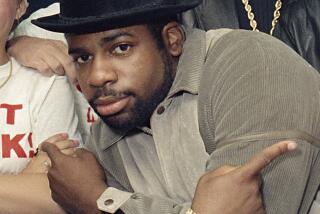Jailed at 14, Youth Refused to Surrender Hope
- Share via
CHICAGO — The first night he was locked up, Calvin Ollins stood on his bed so he could see out the window. Through the double-thick glass, the 14-year-old boy watched the snow fall and cried.
He was scared and confused. A special-ed student who could barely read, he had no idea of how much trouble he was in.
The eighth-grader was being held in the rape and bludgeoning murder of Lori Roscetti, a 23-year-old medical student. It was a “heater” case that had put pressure on police to find the killers fast.
Three months after the October 1986 murder, four teens were arrested, the youngest being Calvin Ollins.
He repeatedly denied doing anything wrong. But he says police kept telling him his cousin, Larry--also one of the four--had implicated him and if he admitted his role he could go home.
So Calvin Ollins confessed. He thought he would be returning to his mother. When that didn’t happen, he tried to recant, but it was too late.
He, his cousin and two others--Omar Saunders and Marcellius Bradford--were convicted. Bradford had confessed too, but says he implicated the others after the police beat him and he was promised a reduced sentence.
At his sentencing, Calvin Ollins maintained his innocence. “I want to say that I was found guilty for something that I didn’t do,” he said. “And I always tell myself that I will be out one day and that God will do something for me.”
Ollins was sentenced to life. He served nearly 15 years--more than half his life--before DNA tests unlocked the prison doors last December. By then, he was a half-year shy of his 30th birthday.
“To go in as a young kid and to come out as a man--it’s not easy to accept,” he says quietly. “You see all the good times you could have had ... “
He refuses to dwell on milestones he missed--high school, learning to drive, dating--because, he says, “you won’t be able to function like a normal human being, and then you might as well go to the grave being defeated.”
Attorney Kathleen Zellner calls the case “one of the greatest frauds ever perpetrated in a Chicago courtroom.”
She has filed suit on behalf of the four men, claiming authorities manufactured phony evidence, coerced confessions and falsified lab test results. Police and prosecutors declined comment.
This February, police announced two men had confessed to the Roscetti murder, and DNA tests linked them to the crime.
During his long years in juvenile detention and prison, Ollins never gave up hope.
“When you’re guilty, you’re not expecting anything,” he says. “But when you’re innocent, you’re expecting something--you don’t know what or when or how it’s going to happen.”
It almost didn’t happen.
When the Innocence Project looked into the possibility of DNA testing, Chicago police reported that evidence had been destroyed. But Zellner, who later took on the case, knew those materials were stored in the clerk’s warehouse and had them tested.
Twenty-nine pieces of DNA evidence cleared them.
Today, Ollins has an apartment, a car and a girlfriend, Adelle.
He works as a paralegal for Zellner, screening letters from inmates who claim they’re innocent.
His exuberance amazes her. “He has a complete appreciation of every day, every moment, all the small things we all take for granted,” she says.
More to Read
Sign up for Essential California
The most important California stories and recommendations in your inbox every morning.
You may occasionally receive promotional content from the Los Angeles Times.










